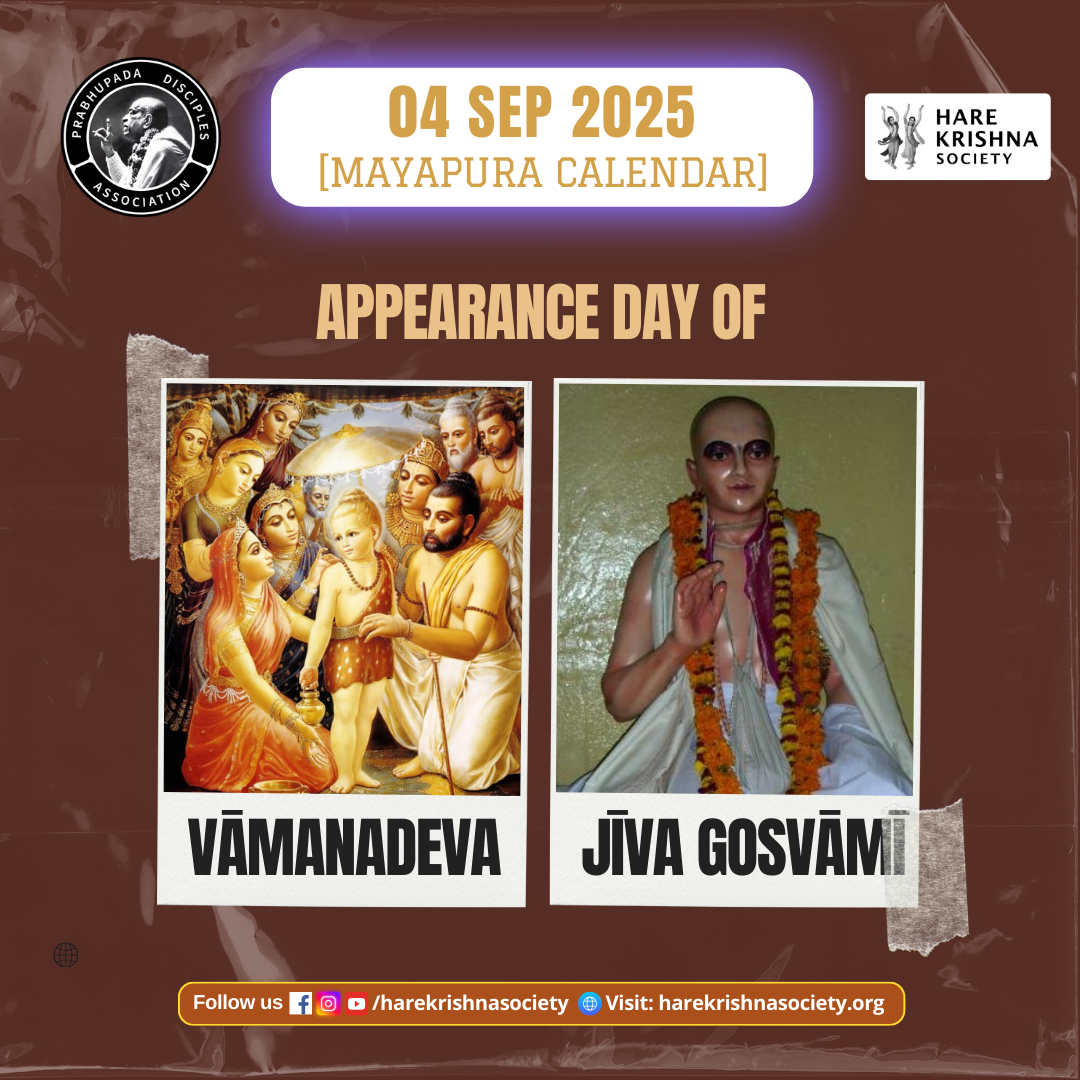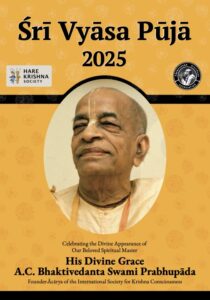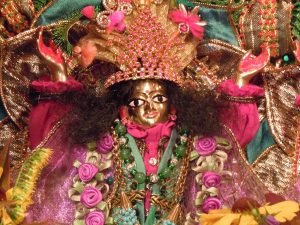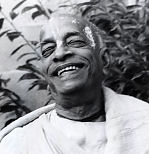
04 September 2025 [Mayapur, West Bengal, India Time]
Śrī Vāmana Dvadashi – Lord Vāmanadeva Appearance Day
Śrī Jīva Gosvāmī – Appearance Day
______________________________________________
Śrī Vāmana Dvadashi – Lord Vāmanadeva Appearance Day
“In the fifteenth incarnation, the Lord assumed the form of a dwarf-brāhmaṇa [Vāmana] and visited the arena of sacrifice arranged by Mahārāja Bali. Although at heart He was willing to regain the kingdom of the three planetary systems, He simply asked for a donation of three steps of land.”
(Śrīmad Bhāgavatam 1.3.19 | 1972 Edition)
Śrīla Prabhupāda: There is a nice story of a great devotee, Bali Mahārāja. Bali Mahārāja was a very powerful king and he conquered over the heavenly planets. So the denizens of the heavenly planets, they appealed to the Supreme Lord to save them, that “We are now conquered by the demonic king, Bali Mahārāja.” So Bali Mahārāja… And Kṛṣṇa, Kṛṣṇa took the shape of a dwarf and went to Bali Mahārāja for begging as a brāhmaṇa boy. And He approached him, Bali Mahārāja, “I want something from you. You are a great king. You give in charity to the brāhmaṇas. So I want something from you.”
So Bali Mahārāja said, “Yes, I shall give You. What do You want?” “Now, I want land of three, in the measurement of My sole, three sole measurements. That’s all.” So He was a boy, His sole was sole, not very long. So Bali Mahārāja said, “What You will do with a small piece of land?” But He said, “Yes, that will suffice Me. If you promise this three measurement of My three feet of land, that will suffice.” Then Bali Mahārāja agreed, and by His two measurement of the palm, He covered the whole universe.
Then He’s asking, “Bali Mahārāja, now whatever you have got, you got, now it is finished by two feet, by two measurement of my palm. Now where I am going to keep My third, third one?” Then Bali Mahārāja understood that it is the favor of the Supreme Lord. He said, “My dear Lord, yes, I have now lost everything. I have no other property, but I have got my head. Please kindly keep on it.” You see.
So the Lord was very much pleased on him, and He offered, “Bali Mahārāja, then what do you want from Me?” “No, I never expected anything from You. I could understand You wanted from me everything; so I have offered my everything. That is finished. I don’t want…” Then Lord says, “Yes, but from My side, I have got something to offer you. I shall remain as your order-carrier servant in your door.”
So He remained always… Just like we are sitting here, there may be some doorman, He, Lord became his doorman. So that is the return. If we offer something to Lord, oh, that is rewarded in many millions of times. So we should not expect. The Lord is always serious to return the service of the servant, of His devotee. So there are many devotees. This devotee, Bali Mahārāja, is surrendered everything for the service of the Lord. So he became a famous king. Sarvātma-snapane abhavad balir vaiyāsakiḥ.
(Excerpt from Lecture on Bhagavad-gītā 6.1-4 — New York, September 2, 1966)
To learn more, read Śrīmad-Bhāgavatam, Canto 8, Chapter Eighteen – “Lord Vāmanadeva, the Dwarf Incarnation”
_________________________________________________________________
Śrī Jīva Gosvāmī – Appearance Day
Śrīla Prabhupāda: “In the Gaura-gaṇoddeśa-dīpikā it is said that Śrīla Jīva Gosvāmī was formerly Vilāsa-mañjarī gopī. From his very childhood Jīva Gosvāmī was greatly fond of Śrīmad-Bhāgavatam. He later came to Navadvīpa to study Sanskrit, and, following in the footsteps of Śrī Nityānanda Prabhu, he circumambulated the entire Navadvīpa-dhāma. After visiting Navadvīpa-dhāma he went to Benares to study Sanskrit under Madhusūdana Vācaspati, and after finishing his studies in Benares he went to Vṛndāvana and took shelter of his uncles, Śrī Rūpa and Sanātana. This is described in the Bhakti-ratnākara. As far as our information goes, Śrīla Jīva Gosvāmī composed and edited at least twenty-five books. They are all very celebrated, and they are listed as follows:
(1) Hari-nāmāmṛta-vyākaraṇa, (2) Sūtra-mālikā, (3) Dhātu-saṅgraha, (4) Kṛṣṇārcā-dīpikā, (5) Gopāla-virudāvalī, (6) Rasāmṛta-śeṣa, (7) Śrī Mādhava-mahotsava, (8) Śrī Saṅkalpa-kalpavṛkṣa, (9) Bhāvārtha-sūcaka-campū, (10) Gopāla-tāpanī-ṭīkā, (11) a commentary on the Brahma-saṁhitā, (12) a commentary on the Bhakti-rasāmṛta-sindhu, (13) a commentary on the Ujjvala-nīlamaṇi, (14) a commentary on the Yogasāra-stava, (15) a commentary on the Gāyatrī-mantra, as described in the Agni Purāṇa, (16) a description of the Lord’s lotus feet derived from the Padma Purāṇa, (17) a description of the lotus feet of Śrīmatī Rādhārāṇī, (18) Gopāla-campū (in two parts) and (19-25) seven sandarbhas: the Krama-, Tattva-, Bhagavat-, Paramātma-, Kṛṣṇa-, Bhakti- and Prīti-sandarbha.
After the disappearance of Śrīla Rūpa Gosvāmī and Sanātana Gosvāmī in Vṛndāvana, Śrīla Jīva Gosvāmī became the ācārya of all the Vaiṣṇavas in Bengal, Orissa and the rest of the world, and it is he who used to guide them in their devotional service. In Vṛndāvana he established the Rādhā-Dāmodara temple, where we had the opportunity to live and retire until the age of sixty-five, when we decided to come to the United States of America. When Jīva Gosvāmī was still present, Śrīla Kṛṣṇadāsa Kavirāja Gosvāmī compiled his famous Caitanya-caritāmṛta. Later, Śrīla Jīva Gosvāmī inspired Śrīnivāsa Ācārya, Narottama dāsa Ṭhākura and Duḥkhī Kṛṣṇadāsa to preach Kṛṣṇa consciousness in Bengal. Jīva Gosvāmī was informed that all the manuscripts that were collected from Vṛndāvana and sent to Bengal for preaching purposes were plundered near Viṣṇupura, in Bengal, but later he received the information that the books had been recovered. Śrī Jīva Gosvāmī awarded the designation Kavirāja to Rāmacandra Sena, a disciple of Śrīnivāsa Ācārya’s, and his younger brother Govinda. While Jīva Gosvāmī was alive, Śrīmatī Jāhnavī-devī, the pleasure potency of Śrī Nityānanda Prabhu, went to Vṛndāvana with a few devotees. Jīva Gosvāmī was very kind to the Gauḍīya Vaiṣṇavas, the Vaiṣṇavas from Bengal. Whoever went to Vṛndāvana he provided with a residence and prasāda. His disciple Kṛṣṇadāsa Adhikārī listed all the books of the Gosvāmīs in his diary.
The sahajiyās level three accusations against Śrīla Jīva Gosvāmī. This is certainly not congenial with the execution of devotional service. The first accusation concerns a materialist who was very proud of his reputation as a great Sanskrit scholar and approached Śrī Rūpa and Sanātana to argue with them about the revealed scriptures. Śrīla Rūpa Gosvāmī and Sanātana Gosvāmī, not wanting to waste their time, gave him a written statement that he had defeated them in a debate on the revealed scriptures. Taking this paper, the scholar approached Jīva Gosvāmī for a similar certificate of defeat, but Jīva Gosvāmī did not agree to give him one. On the contrary, he argued with him regarding the scriptures and defeated him. Certainly, it was right for Jīva Gosvāmī to stop such a dishonest scholar from advertising that he had defeated Śrīla Rūpa Gosvāmī and Sanātana Gosvāmī, but due to their illiteracy the sahajiyā class refer to this incident to accuse Śrīla Jīva Gosvāmī of deviating from the principle of humility. They do not know, however, that humility and meekness are appropriate when one’s own honor is insulted but not when Lord Viṣṇu or the ācāryas are blasphemed. In such cases one should not be humble and meek but must act. One should follow the example given by Śrī Caitanya Mahāprabhu. Lord Caitanya says in His Śikṣāṣṭaka (3):
tṛṇād api sunīcena
taror ivasahiṣṇunā
amāninā mānadena
kīrtanīyaḥ sadā hariḥ
“One can chant the holy name of the Lord in a humble state of mind, thinking himself lower than the straw in the street. One should be more tolerant than a tree, devoid of all sense of false prestige, and should be ready to offer all respect to others. In such a state of mind one can chant the holy name of the Lord constantly.” Nevertheless, when the Lord was informed that Nityānanda Prabhu was injured by Jagāi and Mādhāi, He immediately went to the spot, angry like fire, wanting to kill them. Thus, Lord Caitanya has explained His verse by the example of His own behavior. One should tolerate insults against oneself, but when there is blasphemy committed against superiors such as other Vaiṣṇavas, one should be neither humble nor meek; one must take proper steps to counteract such blasphemy. This is the duty of a servant of a guru and Vaiṣṇavas. Anyone who understands the principle of eternal servitude to the guru and Vaiṣṇavas will appreciate the action of Śrī Jīva Gosvāmī in connection with the so-called scholar’s victory over his gurus, Śrīla Rūpa and Śrīla Sanātana Gosvāmī.
Another story fabricated to defame Śrīla Jīva Gosvāmī states that after compiling Śrī Caitanya-caritāmṛta, Śrīla Kṛṣṇadāsa Kavirāja Gosvāmī showed the manuscript to Jīva Gosvāmī, who thought that it would hamper his reputation as a big scholar and therefore threw it in a well. Śrīla Kṛṣṇadāsa Kavirāja Gosvāmī was greatly shocked, and he died immediately. Fortunately, a copy of the manuscript of Śrī Caitanya-caritāmṛta had been kept by a person named Mukunda, and therefore later it was possible to publish the book. This story is another ignominious example of blasphemy against a guru and Vaiṣṇava. Such a story should never be accepted as authoritative.
According to another accusation, Śrīla Jīva Gosvāmī did not approve of the principles of the pārakīya-rasa of Vraja-dhāma and therefore supported svakīya-rasa, showing that Rādhā and Kṛṣṇa are eternally married. Actually, when Jīva Gosvāmī was alive, some of his followers disliked the pārakīya-rasa of the gopīs. Therefore, Śrīla Jīva Gosvāmī, for their spiritual benefit, supported svakīya-rasa, for he could understand that sahajiyās would otherwise exploit the pārakīya-rasa, as they are actually doing at the present. Unfortunately, in Vṛndāvana and Navadvīpa it has become fashionable among sahajiyās, in their debauchery, to find an unmarried sexual partner to live with to execute devotional service in pārakīya-rasa. Foreseeing this, Śrīla Jīva Gosvāmī supported svakīya-rasa, and later all the Vaiṣṇava ācāryas also approved of it. Śrīla Jīva Gosvāmī was never opposed to the transcendental pārakīya-rasa, nor has any other Vaiṣṇava disapproved of it. Śrīla Jīva Gosvāmī strictly followed his predecessor gurus and Vaiṣṇavas, Śrīla Rūpa and Sanātana Gosvāmī, and Śrīla Kṛṣṇadāsa Kavirāja Gosvāmī accepted him as one of his instructor gurus.”
(Śrī Caitanya-caritāmṛta, Ādi-līlā 10.85, Purport | 1973 Edition)
Read More – https://harekrishnasociety.org/?p=30571









